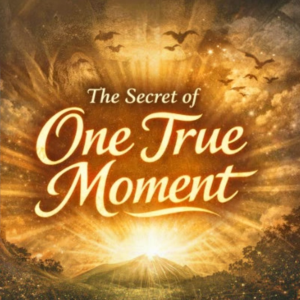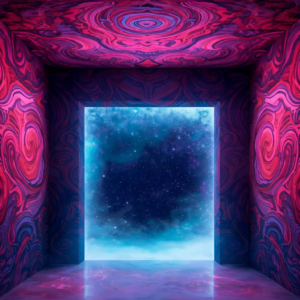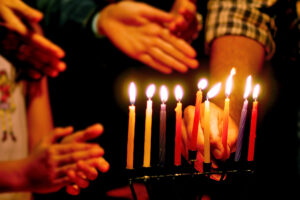THE POWER OF THOUGHT (PART II)
Man is a microcosm of the Creation itself. His mind and heart are the source of all his thoughts and all the actions he will perform!
…Day “VaYeetzer – and God created man…” (Genesis 2:7). Why does the letter yod (י) appear twice in the word yeetzer (וייצר, created) when once would have been sufficient? Because there were two creations – the good inclination and the evil inclination (Berakhot 61a).
When God decided to create the world, He constricted Himself, as it were, and first created the Vacated Space. (That is, God was everywhere. There was no room for the Creation. So He constricted Himself, as it were, to create the Vacated Space.] Within this Vacated Space, He designed and created the world and everything in it. The entire creation was for man, that man should have the free will to choose between good (Light) and evil (Darkness). This way, God’s Kingship can now be revealed to all (Etz Chaim 1).
Rebbe Nachman teaches: Man is a microcosm of the Creation itself. His mind and heart are the source of all his thoughts and all the actions he will perform. In this sense, his mind, being the source of his ideas and goals, is like the Vacated Space. These thoughts convey the ideas to the heart (the source of one’s emotions), which then dictates to the body what to do. Thus, to perform good deeds, one must have a pure heart. In order to have a clean and pure heart, one must think good thoughts. And, whereas thinking evil thoughts literally creates evil within oneself, thinking good thoughts actually gives rise to a “good creation.” He creates a clean and pure heart in which Godliness can be revealed; his heart then burns with great desire to serve God. Man’s duty is to control this burning desire and keep it within his power to perform the mitzvot according to his capabilities, without reaching too high for his own good (Likutey Moharan I, 49:1).
Reb Noson writes: The battle between good and evil thoughts is the main reason for the Creation. The confusing thoughts in our minds correspond to the chaos and desolation that were created at the very beginning. We have to overcome these evil thoughts, and we can – by thinking positive thoughts, by concentrating on good thoughts and constantly thinking of ways to come closer to God. Through this process, we are, in a sense, re-creating Creation itself. And, all of us can do this. Ever day, each of us has the ability to create new worlds. Each day is unique. it has something new, fresh and different, that never was before. And so, each day we should seek new thoughts and ideas and how to come closer to God.
And remember: even if we are overwhelmed by evil thoughts, even though we have tried many times to run away from the bad ideas that converge upon us, we always have the power to overcome them. For each day is a new creation, each and every day brings with it the concept of renewal. Start again. Start over. If we encounter difficulties and seemingly endless obstacles to good thoughts., then we must cry out to God for help. Pray, appeal and plead to God to reveal Himself to us, to guide us on the right path.
We have to overcome these evil thoughts, and we can – by thinking positive thoughts, by concentrating on good thoughts and constantly thinking of ways to come closer to God.
From the Kabbalah we learn that God created the Vacated Space to make room for Creation. If you think about this, you’ll realize that this in itself is a great paradox. God, as it were, withdrew His Godliness; however, without Godliness, nothing can exist. Yet we see that Creation certainly did take place, the world certainly does exist. So God does exist in the Vacated Space. The Vacated Space may look absolutely void and vacated, but it’s not. Just as, by looking really hard, we can always find God even in the Vacated Space, so too, we can find Him even in the tumult and confusion that beset us in the Darkness of our lives.
This teaches us that although there are things we cannot understand, things which remain paradoxical no matter what, we must strengthen ourselves each and every day to think good thoughts. We are important enough in God’s eyes to be considered mini-creators. Each and every one of us is entrusted with these powers to create. Our thoughts, our desires create Day, they create the good that exists in this world (Likutey Halakhot, Minchah 7:2).

Another means for “creating Day,” i.e. creating good, is through the expression of one’s holy thoughts and desires verbally. Not only should we think good thoughts, we should also enunciate them, speak them out and pronounce them, whether in prayer or by way of conversation.
Rebbe Nachman teaches: the [Hebrew] letters in Torah have no vowels. Like a body without a soul, they have no movement. (For example, the word ישב, yshv, can be read: yOshEv, yEIshEIv, yAshAv, yAshOv, yAshUv, and so on.) Inserting vowels gives meaning to the word. This can be seen as the connotation of the phrase (Song of Songs 1:11): “Nekudot hakasef – the vowels come from desire.” [Nekudot are vowels and kasef is Aramaic for desire.] (Likutey Moharan I, 31:6-7, end; also see Ibid. 66:4).
From this we learn that our desire gives meaning to the letters and words that we speak. if we have good desires, we will speak good words and thereby create good letter and word combinations. this will, in turn, eventually lead us to perform good and kind acts. If however, our desires are for evil, we create evil combinations and bring these into the world. We should therefore always speak good, always speak out and declare positive desires. By doing this, we “create” a positive attitude towards good deeds and actually benefit the world through the Light which the expression of our holy thoughts and desire brings.
(Taken from the book Crossing the Narrow Bridge – chapter 11 – DAY AND NIGHT)
- 0 comment






















